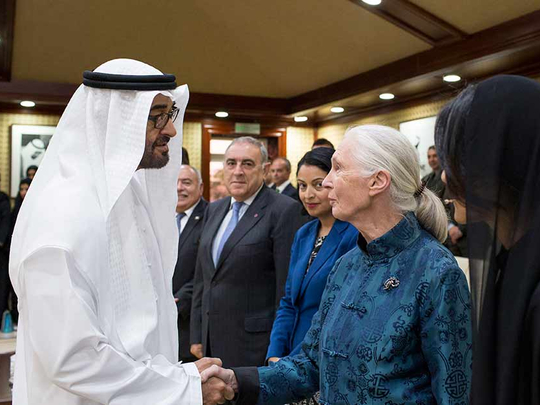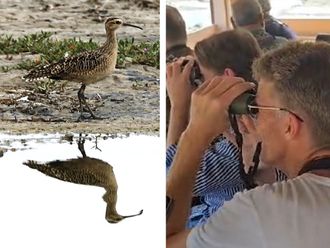
Abu Dhabi: Famed primatologist and environmentalist Dr Jane Goodall has praised the UAE’s environment conservation efforts and the founding father’s foresight in laying the groundwork for environmental protection.
Dr Goodall said she was impressed by the foresight of Shaikh Zayed in captive breeding and reintroduction programmes of the Arabian Oryx and Abu Dhabi’s protected Oak (mangrove) forests in Sir Bani Yas.
Dr Goodall, arguably the most famous conservationist and the best known and respected female scientist on the planet today, was talking last night to a packed house at the majlis of His Highness Shaikh Mohammad Bin Zayed Al Nahyan, Crown Prince of Abu Dhabi and Deputy Supreme Commander of the UAE Armed Forces.
Dr Goodall also praised the conservation efforts of the Mohammad Bin Zayed Species Conservation Fund, which she said bred and returned 500 oryx, extinct in the wild, back to their habitat in Chad.
Dr Goodall shared her early childhood story growing up in England with a supportive mother and how she reached Kenya where she met the famous paleontologist/anthropologist Dr Louis Leakey. This meeting led to an opportunity for her to study wild chimpanzees at Gombe in Western Tanzania.
Told to “never give up” by her mother, Goodall set out in her 20s to pursue her childhood dream: to live with animals in Africa.
‘My mother said to me ‘If you really want something you will have to work really hard, take advantage of opportunities — and never give up,’” she said.
Dr Goodall reflected on the early years at Gombe, the ongoing 55 year research there and the many ways in which chimpanzees are so like us.
She talked about their family structure, their communication, postures, gestures and their darker side.
After arriving at Cambridge University two years later, Dr Goodall was told that she had done everything wrong and that giving the chimps numbers was ‘more scientific’ than the names she had used. She will discuss the changes in science over the intervening years, and the ever-growing role of conservation science in working with local communities to regenerate forests and thus benefit both wildlife and people.
Goodall reached out to younger generations. In 1991 she launched Roots and Shoots, an environmental education and service platform that today has more than 150,000 members in over 130 countries. Meanwhile the Jane Goodall Institute, her research and conservation organisation, has also expanded beyond its original mission and now has operations in 29 countries.
Dr Goodall told the audience she never lost hope “despite the huge number of problems we face”, stressing she firmly believes there is still time.
“My reasons for hope are simple: The energy, commitment, and hard work of young people once they understand the problems and are empowered to discuss and act upon solutions,” Dr Goodall said.
“Which is why I devote so much time to developing our youth programme, Roots & Shoots. This is for young people from preschool through University. Roots and Shoots is now in 136 countries. Each group chooses three projects: to improve things for people, other animals, and the environment.”
Other reasons for Dr Goodall’s hope are the human brain’s power, including what is happening in Abu Dhabi with solar/wind power and the solar-powered aircraft project which shows the pioneering spirit and innovation that can change the world; the resilience of nature; the indomitable human spirit — the people who tackle seemingly impossible tasks and won’t give up and her most recent reason for hope: the power of social media.












